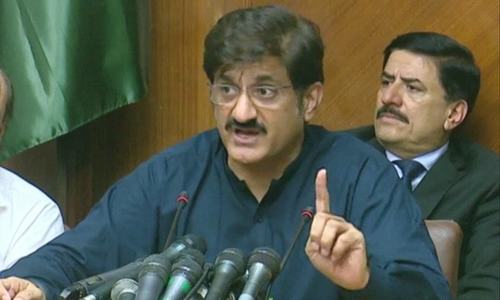The Council of Islamic Ideology (CII) on Thursday endorsed the restrictions imposed by the government on Friday and daily prayer congregations and urged the public not to associate the spread of the novel coronavirus in Pakistan with any sect or religious group.
The governments of all four provinces and the capital administration have limited the number of people that can attend Friday and congregational prayers at mosques to 3-5 in an effort to curb the spread of Covid-19.
In a press briefing following an emergency meeting of the CII held today, its chairman Dr Qibla Ayaz issued the following recommendations for the government and the public regarding the pandemic:
- The CII endorsed the government's restrictions on congregational prayers, saying it "expects people ... to offer prayers at home to ensure social distancing". It said the restrictions should not give the impression that mosques have been locked down, but advised people to implement the limits announced by authorities.
- The council advised government authorities not to arrest mosque imams while enforcing the orders, and seek their cooperation instead so that "they become a part of the government campaign to prevent the coronavirus by adopting safety precautions".
- It stressed that the spread of Covid-19 has nothing to do with any sect or religious group, including Umrah pilgrims, pilgrims to holy sites or members of the Tableeghi Jamaat. "In this regard, steps should be taken according to the law and common sense to rectify the negligence that has taken place at the administrative or individual levels," Dr Ayaz said.
- The council advised able citizens to donate the funds they have set aside for Umrah, pilgrimages or other religious rituals to people affected by Covid-19's economic impact, and especially remember members of minority communities in this regard.
- It called upon the government, public and civil society to jointly work to take steps for the economic relief of the people affected by the coronavirus crisis without any discrimination on religious or geographical grounds.
- The CII said it will be "highly beneficial" to make arrangements to support unemployed people through mosques. It recommended treating mosques as community centres and involve mosques imams in the relief efforts.
- It said arrangements should be made to give 'ghusl' (bath) to people dying from Covid-19 in the best possible manner while taking safety precautions. It added that the fatalities should be referred to as martyrs or janbahaq (dead) instead of halaak (killed).
- The CII said funeral prayers should be offered for people dying from the disease and close relatives should be allowed to participate in last rites while ensuring social distancing and precautions.
- It stressed that it was important to restore all human rights of the people of Indian-occupied Kashmir, who remain under lockdown during the Covid-19 pandemic. The whole world should pay attention to this issue, it added.
- The council asked citizens to take all safety precautions but advised against creating "an atmosphere of fear and panic".
- It called upon the government to make suitable arrangements for people stuck abroad or within the country during the outbreak.
Sindh, Punjab to strictly implement Friday restrictions
Also on Thursday, the Sindh government said it will "strictly implement" lockdown measures on Friday as agreed with the representatives of all schools of thought to restrict congregational prayers to four to five people, who should also maintain some physical distance between them.
The Sindh home department in a notification issued on Thursday evening, said "there shall be complete ban on all public movement and activities from 12:00pm to 3:30pm on Friday, which may resume from 3:30pm till 6:30pm (for Friday only)."
Rasheed Channa, spokesperson for the Sindh chief minister, said the federal government and all four provinces have now announced extending the lockdown until April 14.
The Punjab government said only 3-5 people will be allowed to offer Friday prayers in mosques, including the khateeb, muezzin and mosque caretaker.
The Sindh government had suspended congregational Friday prayers last week but the ban was violated at certain places in Karachi and other majors cities of the province.
Subsequently, police in Karachi had registered 88 First Information Reports (FIRs) and detained at least 38 prayer leaders and mosque officials for violating the government's restrictions on collective prayers.
However, ulema later held a meeting with Chief Minister Murad Ali Shah, who directed the police department to withdraw all the FIRs registered against prayer leaders and others for violating the code of conduct made for Jumma prayers.
“Ulema have already agreed not to hold Friday prayer [congregations] in view of medical advice to prevent the spread of the coronavirus,” said Channa.
With additional reporting by Ali Waqar in Lahore.















































